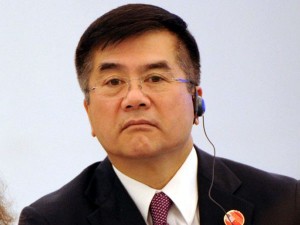BEIJING—US envoy to Beijing Gary Locke on Saturday tried to ease China’s fears that Washington wants to hem it in by emphasizing American military presence in Asia was not targeted at a single country.
“We strongly believe — and I believe most in the region would agree — that our security presence here is beneficial to the countries of the region and necessary for the continued vitality of the Asia-Pacific,” Locke said.
“Our security presence is not aimed at any one country,” he said in a speech at Peking University, noting that the United States was also boosting its diplomatic and economic engagement in the region.
Locke’s remarks came days ahead of a planned visit to Beijing by US Secretary of State Hillary Clinton to discuss the two countries’ sometimes tense economic and security relationship.
Chinese state media have accused Washington of trying to contain China by befriending regional countries — a view that has been reinforced by Clinton’s decision to start her trip in the often-overlooked South Pacific.
Clinton — the first US secretary of state to attend an annual South Pacific summit — announced in the Cook Islands on Friday $32 million in aid projects.
She emphasized, however, that there was ample room for all countries — including the United States and China — to work together to help Pacific nations.
Chinese media have warned the United States against seeking to exploit recent escalations over territorial sea disputes between China and its neighbors, including Japan, the Philippines and Vietnam.
Some countries in the region already have US military support while others seek closer security ties to counter what they call China’s growing assertiveness in the sovereignty disagreements.
Locke also stressed the importance — but also the challenge — of strengthening US-China cooperation, highlighting contentious issues such as trade relations, currency policies, Iran, Syria and human rights.
“A China that is more open to all views, ideas and expressions, will lead to a stronger and more secure China,” he said.
“We’ve got a long way to go” in US-China cooperation, he said, “but I’m hopeful that working together we can escape from historical patterns and instead forge a legacy of cooperation and partnership.”
